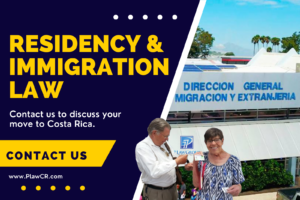- Mon - Fri 09:00-5:00
Residency and Immigration

Once you have spent some time in Costa Rica and then decided that you want to live in Costa Rica on a more permanent basis it is time to consider which residency category you will qualify for.
Costa Rica Immigration Law ( Law #8764) divides residency categories into the following sections:
Permanent Residency (Article 77-78)
Temporary Residency (Article 79-86)
Special Category Residency (Article 93-97)
Let’s break each one of these down for you so you can determine which category is the best fit for you.
Permanent Residency Category
Permanent residency is only available to foreigners under two circumstances: (1) Foreigners that have an immediate family relationship with a Costa Rica citizen. This is generally limited to first degree family relationships such as the parent of a Costa Rica citizen, their minor children, children over 18 years old who have a disability or their minor siblings. (2) Foreigners that have held a temporary residency status for at least three years may then apply to have that temporary status converted to permanent residency. Given the limitations most initial applicants for residency in Costa Rica do so under the Temporary Residency Category which provides more options that I will discuss in the next section.
Temporary Residency Category
The majority of applications for Costa Rican residency will fall into the Temporary Residency category which is regulated by Article 79 of the Immigration Law and has the following subcategories
(1) The Spouse of a Costa Rican citizen as set forth in Article 73 of the law.
(2) Those of religious orders for religions that have been accredited by the Ministry of Foreign Relations and Culture
(3) Executives, Managers, Technical Personnel for Corporations which are established in the country. This may also include those specialized workers that are independent workers but whose technical expertise is required and the Department of Immigration as set forth the criteria to allow that specialty to work in Costa Rica.
(4) Investors
(5) Scientific, Professional and Specialized persons.
(6) Sports figures recognized by the National Council on Sports and Recreation
(7) International Press Correspondents
(8) Rentistas
(9) Pensionados
The Most Common Initial Classification
Most of you that will move or retire to Costa Rica will start out in the Temporary Residency category as either Retiree (Pensionad0), Rentista (Income Recipient) or Investor. To promote these three categories Costa Rica passed Legislation to Attract Investors, Rentistas, and Pensionados Law 9996 which I will discuss below in more detail.
Pensionados (Retiree)
Costa Rica was a pioneer in creating a retirement residency program which has been in effect now for more than 40 years.
The Pensionado (Retiree) applicant must demonstrate a lifetime pension source of income of at least US$1,000 per month. The typical applicant in this category has a government, private sector pension or social security retirement benefits. The legal basis for the pensionado category under the immigration law is Article 81 of Law 8764 and Law 9996.
Rentistas
To qualify for residency under the Rentista category (Article 82), applicants are required to demonstrate a consistent and guaranteed monthly income of at least US$2,500 for a minimum of 2 years. This income source should be stable, reliable, and irreversible. The Rentista category encompasses the primary applicant, their spouse, and dependent children under the age of 25.
Typically, individuals pursuing Rentista residency lack a traditional pension and instead rely on income generated from investments. This income origin must be verified by a recognized financial or banking institution. Verification involves obtaining a letter from a bank or financial establishment, confirming that the applicant will receive a monthly sum of $2,500 within Costa Rica. The letter should explicitly state that the funds will be consistently and irrevocably transferred to Costa Rica over a 2-year period. Ensuring that these specific terms are included in the income letter, which forms the foundation of the residency application, is essential to prevent delays in processing.
If the applicant’s home country bank is unable to provide the income letter with the required wording, an alternative option is to collaborate with a Costa Rican bank. Numerous banks within Costa Rica offer assistance in the rentista application process. To facilitate this, applicants can establish a relationship with a Costa Rican bank and deposit a sum of US$60,000 with them. Subsequently, the bank will arrange to transfer the amount of US$2,500 per month from the deposited funds to the applicant’s savings account at the same institution. This monthly sum can be utilized as needed.
Investors
The Investor Category (Article 79 (4) )and Lww 9996 requires an applicant to demonstrate that they have made an investment in Costa Rica. To qualify for investment status the applicant must show that they have invested at least US$150,000 in Costa Rica. According to the Immigration regulations: “The investment can be made in tangible property, shares, negotiable instruments, productive projects or projects which are deemed of national interest”
The investor category allows individuals that have purchased real estate in Costa Rica with a value of at least US$150,000 to qualify for investor residency. You can also combine investments to reach the investment threshold.
© Copyright by P Law Group 2023
No products in the cart.


